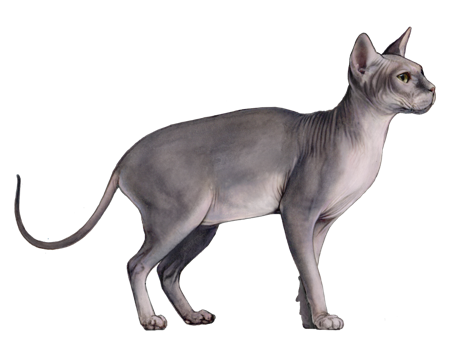
Tennessee Rex
The Tennessee Rex (also known as the T-Rex) is a relatively new cat breed. Their curly, satiny coats are sure to catch your eye, while their gentle, playful personalities will warm your heart.
Interested in discovering if your cat is a Tennessee Rex?
Check out Wisdom Panel's DNA test.
Tennessee Rex Traits
General Appearance
Tennessee Rex are medium-to-large cats with a naturally occurring gene mutation that gives them a curly, glistening coat. They have long, rectangular bodies and muscular, athletic builds.
Coat and Coloring
The T-Rex comes in longhaired and shorthaired varieties. Longhairs have medium-long fur and a fully plumed tail, whereas shorthairs have medium-short hair with a reed tail. In both varieties, curls are more prominent on the neck and jowls than under the chin. And tight curls become longer and wavier as they move down the length of the body. Even the breed's whiskers can be wavy or curly.
The satin effect causes the hair to sparkle in the light and intensifies the color of the coat. All coat colors and patterns are possible.
Distinctive Physical Traits
Aside from coat, the Tennessee Rex's other distinguishing features include a modified wedge-shaped head, medium-large, cupped ears, and large, almond-shaped eyes.
Tennessee Rex Temperament
The Tennessee Rex is a gentle, people-oriented breed that wants to be part of the family. They love to follow their humans around the house, curl up on the couch, and share the bed at night. They're also generally quiet cats with playful personalities.
Tennessee Rex History
Franklin Whittenburg discovered the Tennessee Rex breed in 2004. He took in a semi-feral mother and her litter of kittens that he found roaming his property in Chattanooga. He soon realized that two of the male kittens had unique-looking coats—their soft, red fur was curly and had a shimmery sheen.
Not knowing much about cat breeding himself, Franklin contacted breeders, feline geneticists, and representatives from The International Cat Association (TICA). Through this research, Franklin learned that his cats possessed a new recessive gene that produced curly coats with a satin effect. He then began a breeding program, in partnership with other breeders, to preserve this new mutation.
The Tennessee Rex is currently working toward Championship status with TICA and remains a rare breed.
Tennessee Rex Care
Nutrition
Tennessee Rex require a high-quality diet. Because nutritional needs vary for kittens, adults, and senior cats, opt for a formula that's age-appropriate for your pet.
All cats are at risk of obesity if they overeat. One easy way to avoid overfeeding is to use a standard measuring cup to portion out their food. And don't forget to account for treats. As a guideline, they should make up no more than 10% of your cat's calories.
Lastly, all cats need access to fresh, clean water around the clock.
Grooming
Both longhaired and shorthaired T-Rex need regular brushing to remove loose hair. Once a week is typically enough for shorthaired cats. Longhaired cats need more frequent brushing (up to three times a week) to prevent mats or tangles.
Grooming routines should also include regular ear cleanings to clear wax build-up and monthly nail trims to keep their claws in good shape. Long nails are more likely to snag on something and become torn or damaged. They can even grow into your cat's paw pads, leading to pain or infection. In addition to clipping, providing a scratching post will allow your cat to do some nail maintenance themselves (thanks to their instinct to scratch).
As a final grooming to-do, aim to brush your cat's teeth daily and schedule visits with your veterinarian for professional dental cleanings and exams. Besides giving your cat better breath, such efforts will support their overall health.
Health
Roughly one out of every three cats in the United States is overweight or obese. And those extra pounds can contribute to other health risks—such as arthritis, diabetes, and heart problems. Your veterinarian is the best resource for tips on managing your cat's weight.
Breed Group
Western
The largest of breed groups, the Western Group is mainly comprised of cats developed in Europe and the Americas. Due to the complexity of feline genetic diversity, however, cat breeds from other regions may also be found associated with this group.






































